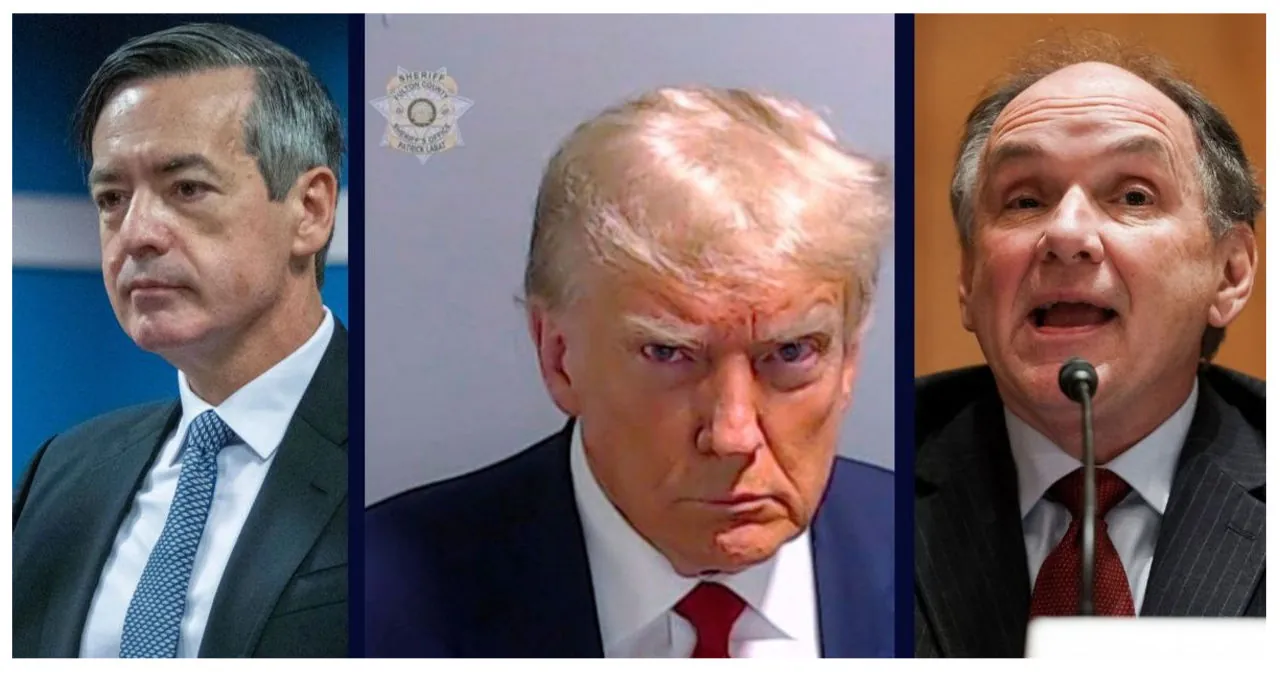Left: Lawyer Kenneth Chesebro is sworn in at a plea bargain hearing on October 20, 2023, at Atlanta’s Fulton County Courthouse. Donald Trump’s booking photo (courtesy of the Fulton County Sheriff’s Office). Right: In December 2020, Trump campaign attorney James Troupis testifies before Congress regarding election integrity.
A plethora of newly released text messages and emails flowing between a lawyer who pleaded guilty to conspiring to file fake elector slates for Donald Trump in Georgia and a campaign lawyer for the former president provide a startling glimpse into a fast-paced world in which Trump’s allies discussed ways to create a “cloud of confusion” in the aftermath of the 2020 election.
The texts and emails are housed in a more than 1,400-page dossier. That document became public this week after a lawsuit filed by Wisconsin voters and electors against Kenneth Chesebro—tthe conservative attorney turned Trump co-conspirator in the Georgia fake electors case—aand campaign lawyer Jim Troupis, as well as other alleged fake electors in the state, was finally resolved.
Chesebro pleaded guilty in November to charges related to the ongoing Georgia election racketeering case. He is not alone; Jenna Ellis, a Trump campaign lawyer and co-conspirator, pleaded guilty a month earlier, after Sidney Powell’s plea to six misdemeanor charges after reaching an agreement with federal prosecutors. Co-conspirator Scott Hall, a Georgia bail bondsman charged with tampering with voting system technology, pleaded guilty to five misdemeanor counts, including conspiracy to commit deliberate interference with election duties.
Chesbro was in charge of preparing a legal paper proposing that then-Vice President Mike Pence replace genuine electors with so-called “alternate” electors on Jan. 6, if other measures to reverse Trump’s electoral setback to now-President Joe Biden failed.
The text messages provide a glimpse into Chesebro’s promotion of conspiracy theories regarding widespread fraud in the 2020 election. As reported by Politico and the New York Times, they also reveal the lawyers’ belief that Trump could still have another opportunity to contest his loss.
Chesebro informed Trump’s campaign lawyer Troupis in an email that Trump had the option to engage in litigation, with the hope of winning by January 6th. Alternatively, he could also exploit the delay in litigation to potentially secure a victory in the state legislature on December 8th.
In a message just days after January 6, Chesebro remained dedicated to finding ways to bring Trump back to the White House, stating, “The events of the last two days provide legal opportunities in the states to secure favorable rulings for Trump.”
According to the documents, Chesebro remained determined to see Trump elected, despite facing numerous rejections from the courts regarding his claims of a fraudulent election.
As pointed out by Ryan Goodman, a legal analyst and former Defense Department special counsel, the messages could potentially create a perjury issue for Chesebro.
Chesebro stated during his testimony to a Nevada grand jury that the scheme involving fake electors was dependent on winning litigation before the Congress convened to certify the election on January 6, 2021.
However, in a December 8, 2020 email, Chesebro contradicted this statement.
In an email sent on December 8th at 12:15 a.m., Chesebro expressed the opinion that court challenges regarding the events of January 6th were unnecessary.
According to Goodman, Chesebro had privately taken the opposite stance, despite telling prosecutors in Michigan investigating fake electors there the same thing.
According to Goodman, the newly discovered emails from the settlement serve as compelling evidence that Chesebro committed perjury.
Chesebro’s attorney did not respond immediately when Law&Crime requested a comment. Troupis, on the other hand, stated to the Times on Monday that he reached a settlement with Wisconsin voters in order to prevent prolonged legal battles. He made it clear that the settlement does not imply any admission of fault.

